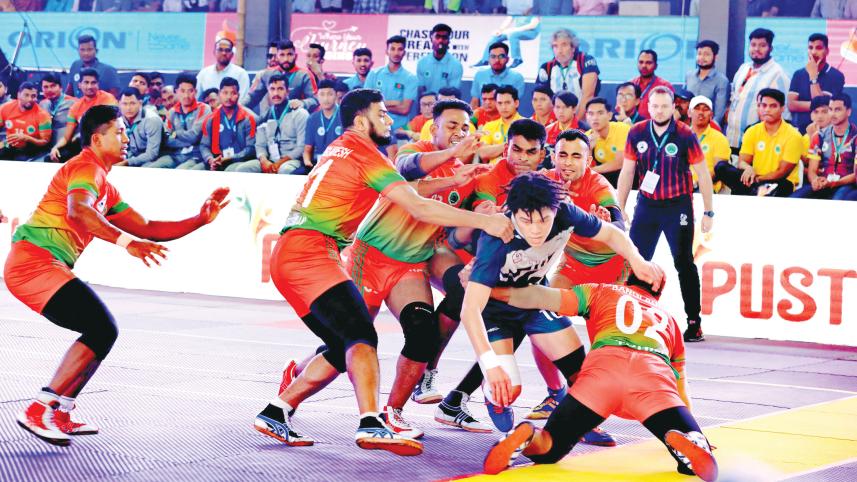Third straight title fails to mask shortcomings

Bangladesh maintained their dominance in the Bangabandhu Cup International Kabaddi, clinching their third title in a row with an emphatic 42-28 win over Chinese Taipei in the final at the Shaheed Noor Hossain National Volleyball Stadium yesterday, but the hosts were clearly lacking the match temperament that once buoyed them to the top of the kabaddi world.
Under the guidance of Indian coach Chhaju Ram, Bangladesh have become unstoppable in the Bangabandhu Gold Cup, but Chhaju believes a lack of matches is a hindrance to further progression.
"The boys don't have any problem except in terms of match temperament. The Indian players play a lot of competitive matches and gain that match temperament, but here in Bangladesh there is hardly any opportunity to play competitive matches except this international tournament," the coach lamented. "Technique and tactics are all good, but the players' mindset is not good. It will develop as they will play competitive matches."
Bangladesh were once ahead of teams like Iran, Pakistan and South Korea, but the downturn has been sharp, with the men in red and green even failing to qualify for the semifinals of the kabaddi event at the Asian Games in the last three editions since reaching the last-four in the 2010 Asian Games.
To close the gap with the top teams, the Indian coach suggested play more friendly matches against India, whose players usually play a lot of competitive matches including the domestic Pro-Kabaddi League.
"If Bangladesh plays friendly matches against India regularly, then the gap with other top teams can be reduced. Bangladesh have talented players; the only weakness is that they lack match practice. Meanwhile, Indian players play a lot of local tournaments, thus gaining in confident and learning how to control, attack and everything else. They get all that from domestic competition," Chhaju said, adding that their next objective was to deliver a medal in the upcoming Asian Games in China.
Although the Indian coach emphasised the Bangladeshi players lack of competitions was hindering their improvement, he believed the team had grown significantly under his coaching.
"Raids have improved, but the defence has not been as good as our raiding in the last three years. However, this time I am satisfied with the defense. They performed well in the tournament," said Chhaju. "The boys had before been caught in do-or-die situations during raids, but they have improved a lot. They also improved in defending in crucial moments. It was tough for opposing raiders to take points from them."
During the final against Chinese Taipei, Bangladesh struggled, conceding points from raids as well as allowing their opponents to pick up bonus points and dominate proceedings. The hosts finally hit back to regain the lead in the second half and never looked back since, winning 42-28.
Captain Tuhin Tarafder said: "Our target was to deliver our best and make the team champions three times in a row. We executed the game plan well. We supported each other and notched an easy win.'
"The start was not good because we were observing the opponents to find out their weaknesses and strengths. Then we exploited their weak points and came out successfully," said man of the final Tuhin Tarafer, adding that they have plans to tour India as part of their preparations for the Asian Games.
"India, Iran, South Korea and Pakistan are ahead of us but I think we have the ability to beat Pakistan. Despite having a healthy lead, we lost narrowly to Korea in 2016 due to inexperience. We have been improving since and I think we can win a medal in the Asian Games, subject to the draw."



 For all latest news, follow The Daily Star's Google News channel.
For all latest news, follow The Daily Star's Google News channel.
Comments